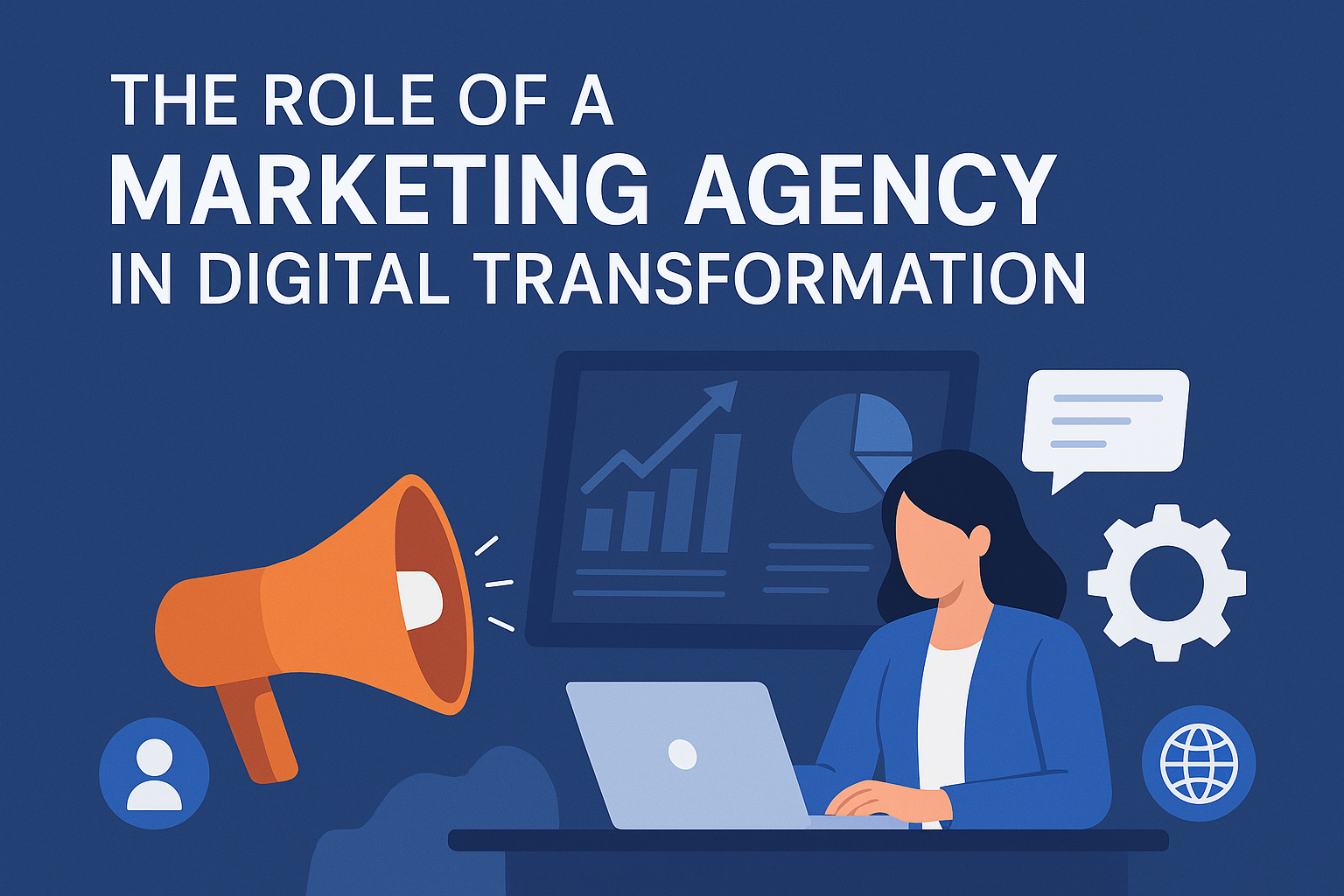
The Role of a Marketing Agency in Digital Transformation
In today’s fast-paced, technology-driven world, businesses are under immense pressure to stay competitive and relevant. One of the most effective ways to achieve this is through digital transformation—the process of integrating digital technology into all areas of business operations to improve efficiency, enhance customer experience, and create new revenue streams. However, digital transformation is not just about adopting new technologies; it’s also about changing mindsets, strategies, and processes. This is where the role of a marketing agency in digital transformation becomes crucial.
A marketing agency is no longer just a service provider for advertising campaigns—it has become a strategic partner that guides businesses through the complexities of digital transformation. From crafting digital-first strategies to implementing advanced marketing technologies, agencies are at the forefront of helping brands thrive in the digital age.
👉 Looking for expert guidance in your digital journey? Partner with Shri Digital to accelerate your business transformation.
1. Guiding the Digital Strategy
Digital transformation begins with a strong strategy. Many businesses struggle to understand where to start, what technologies to adopt, and how to align digital efforts with their overall objectives. A marketing agency brings in expertise, market knowledge, and data-driven insights to help businesses define a clear digital roadmap.
Agencies assess the company’s current digital presence, identify gaps, and recommend strategies that align with customer expectations and business goals. Whether it’s building a user-friendly website, optimizing for search engines, or leveraging social media platforms, agencies ensure that digital initiatives are cohesive and impactful.
2. Enhancing Customer Experience
At the heart of digital transformation lies the customer experience. Modern consumers demand seamless, personalized, and convenient interactions across every touchpoint. A marketing agency helps businesses achieve this by using tools such as customer relationship management (CRM) systems, AI-driven personalization, and data analytics.
For instance, agencies can segment audiences and create tailored marketing campaigns that resonate with different customer groups. By mapping out the customer journey, agencies identify opportunities to engage users at the right time with the right message. The result is improved customer satisfaction, loyalty, and long-term brand trust.
3. Leveraging Data and Analytics
One of the biggest advantages of digital transformation is access to vast amounts of data. However, data is only valuable if it is properly analyzed and applied. Marketing agencies specialize in using analytics tools to gather insights from customer behavior, website traffic, social media interactions, and more.
Through advanced data analysis, agencies help businesses make informed decisions, measure campaign performance, and optimize marketing spend. Predictive analytics, for example, enables businesses to anticipate customer needs and stay ahead of market trends. This data-driven approach ensures that digital transformation efforts are not based on guesswork but on measurable results.
4. Implementing Marketing Technologies
Technology is the backbone of digital transformation. Marketing agencies are well-versed in implementing MarTech (Marketing Technology) solutions such as automation platforms, content management systems, email marketing software, and AI-powered chatbots.
By integrating these technologies, agencies streamline marketing processes, reduce manual work, and improve campaign efficiency. For example, automation tools can nurture leads through personalized email sequences, while AI chatbots provide instant customer support. These innovations not only save time and resources but also enhance the overall customer experience.
5. Driving Digital Innovation
A successful digital transformation requires businesses to embrace innovation. Marketing agencies stay ahead of industry trends and bring fresh, creative ideas to the table. From experimenting with influencer marketing and video content to adopting emerging platforms like voice search and augmented reality (AR), agencies ensure brands remain relevant in a constantly evolving digital landscape.
Agencies also encourage businesses to take calculated risks by testing new strategies and channels. This culture of experimentation fosters innovation, enabling businesses to stand out from competitors and capture audience attention in unique ways.
6. Building an Omnichannel Presence
Today’s customers interact with brands across multiple channels—websites, social media, email, apps, and even offline touchpoints. A marketing agency ensures consistency across all these platforms by creating an omnichannel strategy.
By aligning messaging, design, and tone of voice across different channels, agencies provide a seamless brand experience. This consistency strengthens brand identity and ensures that customers can engage with the business anytime, anywhere, without friction.
7. Training and Upskilling Teams
Digital transformation is not just about outsourcing work—it’s also about empowering internal teams. Many marketing agencies go beyond campaign execution and provide training and upskilling for in-house staff.
Agencies educate teams on using digital tools, analyzing performance metrics, and adopting new marketing practices. This knowledge transfer ensures that the business can sustain its digital transformation journey even after external support concludes.
8. Delivering Measurable ROI
One of the challenges businesses face during digital transformation is proving the return on investment (ROI). Marketing agencies help solve this by setting clear performance metrics and tracking results. From website conversions to lead generation and sales growth, agencies provide detailed reports that showcase the impact of digital initiatives.
This transparency builds confidence and helps businesses refine their strategies for better outcomes.
Conclusion
Digital transformation is no longer optional—it is essential for survival and growth in the modern marketplace. However, the journey can be overwhelming without the right guidance and expertise. A marketing agency acts as a vital partner in this process, providing strategic direction, implementing technology, analyzing data, enhancing customer experiences, and driving innovation.
By leveraging the skills and knowledge of a marketing agency, businesses can not only embrace digital transformation effectively but also create long-term value for their customers and stakeholders. In a world where technology and consumer expectations evolve rapidly, having a marketing agency by your side is not just an advantage—it’s a necessity.
